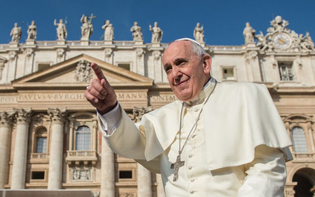Blog
The latest 'creations' of Pope Francis
First published in Pearls and Irritations, 9 October, 2024
Paul Collins
 Pope Francis has just 'created' (appointed) twenty-one new cardinals, twenty of whom under the age of 80 will elect his successor. Among them is a bishop in Australia.
Pope Francis has just 'created' (appointed) twenty-one new cardinals, twenty of whom under the age of 80 will elect his successor. Among them is a bishop in Australia.Dear oh dear! The Australian’s Dennis Shanahan (7/10/24) is “confused” by Pope Francis’ appointment of 44-year-old Mykola Bychok, bishop of the Ukrainian Eparchy (diocese) of Australia, as a cardinal. The Eastern rite Catholic bishop is one of twenty-one new cardinals named last Sunday by Francis.
Well, yes, it is a surprise appointment! But it’s very much in accord with Francis’ priority of reaching out to the peripheries of Catholicism and North Melbourne, where Eparch Bychok lives, seems a long way from Rome. Francis can also be sure that the Eparch’s original episcopal appointment was not influenced by George Pell. Some might interpret his making the Ukrainian Eparch a cardinal as a vote of ‘no confidence’ in the Australian hierarchy, it’s much more about the Ukrainian Catholic church and the Russian invasion of the Eparch’s homeland than about Australia.
Born in western Ukraine in 1980, Bychok joined the Redemptorist religious order, was ordained in Lviv, served in a parish in Prokopyevsk in central-southern Russia, then in Ukraine and in Newark, NJ, he came to Melbourne in early-2020 as successor to Eparch Peter Stasiuk.
The Eparchy was established in 1958 to care for the post-war influx of Ukrainian Catholics. Now numbering about 37,000 in Australia, there are also large diaspora communities in North America, particularly around Winnipeg, Canada.
Cardinal-elect Bychok joins four already appointed cardinals from Oceania: John Ribat, MSC, archbishop of Port Moresby, PNG; Soane Mafi, bishop of Tonga; Virgilio do Carmo da Silva, SDB, archbishop of Dili, Timor-Leste; and John Dew, emeritus-archbishop of Wellington, New Zealand.
Pope Francis was absolutely clear about his intentions in appointing the new cardinals. They “express the universality of the church,” he said after announcing their names last Sunday. Nineteen nations are represented, with five appointees from Latin America, four from Italy and one each from Algeria, Australia, Canada, India, Indonesia, Ivory Coast, Japan, Lithuania, Philippines, Serbia, Iran and the UK. The appointments continue Catholicism’s shift away from a Western and Eurocentric focus to a more global outlook.
Significantly, one of the cardinal-appointees is archbishop of Tehran-Ispahan (Iran), highlighting Francis’ outreach to Islam. No US bishop was appointed, understandable given the overt opposition to Francis from a group of right-wing, pro-Republican, pro-Trump bishops, largely over issues focusing on gender and abortion. The only North American appointed was Toronto archbishop, Frank Leo, who actually spent three years in Canberra working for the papal Nuncio.
The average age of the new appointees is 62. Bishop Bychok is the youngest at 44. Given cardinals lose their vote in papal elections at age 80, it makes sense to appoint – by cardinal standards – younger men. One older appointee was the distinguished English Dominican theologian, Timothy Radcliffe who has just turned 79, but Francis is trying to prevent the College of Cardinals being a gerontocracy.
So, what do these appointments mean for the next papacy? First Francis has reached far beyond Catholicism’s traditional power centres as he develops his vision of a more global, less developed-world church. He has now appointed 80% of the 140 electors who will choose his successor. Excluding deaths, two will turn 80 before the end of 2024, and five more by mid-2025.
Most of these men would be in tune with major trajectories of the Francis papacy. Although they won’t be in agreements with him on everything, I’d be surprised if the next papacy turns back Francis’ move away from Western cultural preoccupations to an emphasis on Catholicism in the developing world, his focus on pastoral care and his vision of the church as a ‘field hospital’ where all are welcome.
So, who next? Despite my total lack of success in predicting papal elections, here’s my take. My numero uno is Matteo Zuppi, archbishop of Bologna. Aged 68, he was formerly a priest and auxiliary bishop of Rome diocese, he’s a cultured man with enormous international experience. In 2022 Francis appointed him the president of the Italian Bishops Conference.
Internationally, Zuppi played a key role in ending the 1990s civil war in Mozambique, where he was given honorary citizenship. In March 2022 Francis used him as his envoy in peace negotiations following the Russian invasion of Ukraine. He met with President Volodymyr Zelensky and other political leaders. He has also tried to meet with Vladimir Putin and the Russian Orthodox leadership without success.
In July 2023 Zuppi met with President Joe Biden in Washington where they discussed the Vatican’s efforts in providing humanitarian aid in Ukraine, and the return of forcibly deported Ukrainian children. He has also recently represented the pope in negotiations with the Chinese government.
As a member of the Rome-based Sant’Egidio Community, Zuppi is involved in world-wide inter-religious dialogue and peace activities. He is sympathetic to LGBTIQ+ issues and is very much in the “Who am I to judge’ tradition.
Answering the criticism that Catholicism is no longer attractive to secularised Westerners, he says that the church has to get closer to people “to talk to everyone and start again.” The Gospel, he says, “should not be reduced to morals. It should be an encounter; it should be life … that speaks to the heart.”
My money’s on Matteo Maria Zuppi as next pope. But don’t ever forget my poor track record on prophesying popes.
Care to comment? .